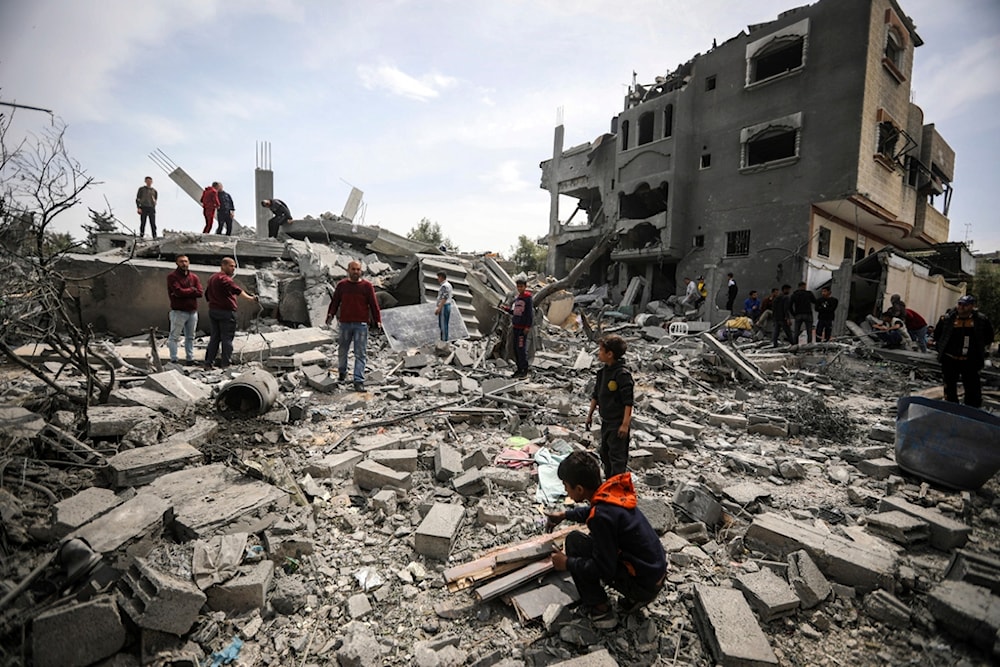'Israel' rejects UN report on Gaza famine warning
According to the Integrated Food Security Phase Classification (IPC) partnership, an estimated 1.1 million people – half of Gaza's population – are facing dire conditions.
-

Palestinians inspect the damage to a residential building for the Moussa family after an Israeli airstrike in the Maghazi refugee camp, central Gaza Strip, Friday, March 29, 2024 (AP)
"Israel" on Friday responded strongly to a recent UN-backed report that sounded the alarm over an impending famine in Gaza, accusing the assessment of inaccuracies and questionable sources.
The report, released last week, heightened international concern by highlighting that half of Gazans are experiencing "catastrophic" hunger, with a potential famine looming in the territory's northern region.
According to the Integrated Food Security Phase Classification (IPC) partnership, an estimated 1.1 million people – half of Gaza's population – are facing dire conditions.
1.1 million people in #Gaza are experiencing the worst level of food insecurity.
— World Food Programme (@WFP) March 26, 2024
WFP provides food packages, wheat flour, and specialized nutrition products to families, while supporting bakeries and over 70 community kitchens.
As #famine looms, we must be able to deliver more. pic.twitter.com/WkYUT1V3KD
UN humanitarian chief Martin Griffiths urged "Israel" to allow unrestricted access for aid to reach the besieged Strip.
In response, COGAT, the Israeli security ministry body "overseeing" Palestinian civil affairs, acknowledged the humanitarian impact of the war on Gaza's civilian population.
But it noted that "Israel" does not manage food distribution in Gaza and criticized UN agencies for their alleged inability to handle the influx of aid.
COGAT disputed the accuracy of the report's claim that 500 trucks, including 150 carrying food, entered Gaza daily before the war erupted, versus 60 food trucks daily since. They countered with their data suggesting that, pre-war, only an average of 70 trucks transported food daily.
"Israel" repeated its debunked lies that it has not imposed restrictions on the volume of humanitarian aid entering Gaza.
IPC report: The report does not reflect the full situation in the Gaza Strip in regard to food security and availability of food.
— COGAT (@cogatonline) March 29, 2024
Our response to the IPC food and food security report: https://t.co/mjOUmOnFjc
The death toll cited by Gaza's health ministry has been widely referenced by various sources, including media and humanitarian organizations, with experts arguing that figures are in fact an undercount rather than an exageration.
Read more: In 175 days only: 32,623 killed, 75,092 injured in Gaza
Starvation is one of the many strategies used by the Israeli regime to lead its genocidal campaign on the Gaza Strip. Blockades thus serve a very specific purpose for the regime.
Recent reports have shown that several people have died so far due to starvation.
This is compounded by several massacres that have taken place at the Kuwaiti roundabout as people gathered to collect food supplies from aid trucks.
Due to several pictures circulating across social media showing bags of flour drenched in blood, these massacres acquired the label of "flour massacres."
The latest massacre occurred just on March 23 and claimed the lives of 19 people while injuring 23 others.
On March 24, the regime announced its decision to no longer allow convoys of humanitarian aid to the North.
UNRWA head Philippe Lazzarini expressed outrage over the matter, saying "Israel's" decision is "intentional to obstruct lifesaving assistance during a man-made famine."

 3 Min Read
3 Min Read








